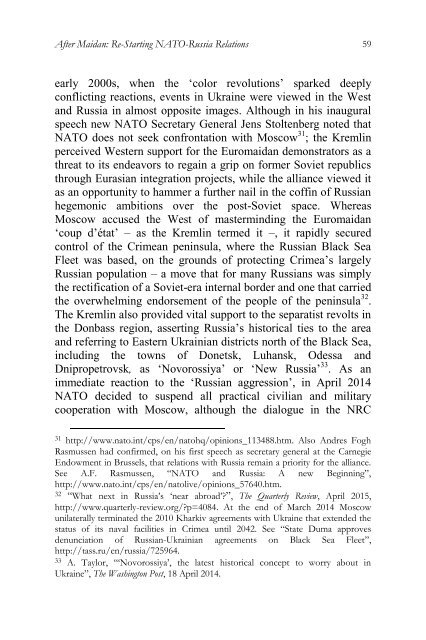beyondukraine.euandrussiainsearchofanewrelation
beyondukraine.euandrussiainsearchofanewrelation
beyondukraine.euandrussiainsearchofanewrelation
You also want an ePaper? Increase the reach of your titles
YUMPU automatically turns print PDFs into web optimized ePapers that Google loves.
After Maidan: Re-Starting NATO-Russia Relations 59<br />
early 2000s, when the ‘color revolutions’ sparked deeply<br />
conflicting reactions, events in Ukraine were viewed in the West<br />
and Russia in almost opposite images. Although in his inaugural<br />
speech new NATO Secretary General Jens Stoltenberg noted that<br />
NATO does not seek confrontation with Moscow 31 ; the Kremlin<br />
perceived Western support for the Euromaidan demonstrators as a<br />
threat to its endeavors to regain a grip on former Soviet republics<br />
through Eurasian integration projects, while the alliance viewed it<br />
as an opportunity to hammer a further nail in the coffin of Russian<br />
hegemonic ambitions over the post-Soviet space. Whereas<br />
Moscow accused the West of masterminding the Euromaidan<br />
‘coup d’état’ – as the Kremlin termed it –, it rapidly secured<br />
control of the Crimean peninsula, where the Russian Black Sea<br />
Fleet was based, on the grounds of protecting Crimea’s largely<br />
Russian population – a move that for many Russians was simply<br />
the rectification of a Soviet-era internal border and one that carried<br />
the overwhelming endorsement of the people of the peninsula 32 .<br />
The Kremlin also provided vital support to the separatist revolts in<br />
the Donbass region, asserting Russia’s historical ties to the area<br />
and referring to Eastern Ukrainian districts north of the Black Sea,<br />
including the towns of Donetsk, Luhansk, Odessa and<br />
Dnipropetrovsk, as ‘Novorossiya’ or ‘New Russia’ 33 . As an<br />
immediate reaction to the ‘Russian aggression’, in April 2014<br />
NATO decided to suspend all practical civilian and military<br />
cooperation with Moscow, although the dialogue in the NRC<br />
31 http://www.nato.int/cps/en/natohq/opinions_113488.htm. Also Andres Fogh<br />
Rasmussen had confirmed, on his first speech as secretary general at the Carnegie<br />
Endowment in Brussels, that relations with Russia remain a priority for the alliance.<br />
See A.F. Rasmussen, “NATO and Russia: A new Beginning”,<br />
http://www.nato.int/cps/en/natolive/opinions_57640.htm.<br />
32 “What next in Russia’s ‘near abroad’?”, The Quarterly Review, April 2015,<br />
http://www.quarterly-review.org/?p=4084. At the end of March 2014 Moscow<br />
unilaterally terminated the 2010 Kharkiv agreements with Ukraine that extended the<br />
status of its naval facilities in Crimea until 2042. See “State Duma approves<br />
denunciation of Russian-Ukrainian agreements on Black Sea Fleet”,<br />
http://tass.ru/en/russia/725964.<br />
33 A. Taylor, ‘‘‘Novorossiya’, the latest historical concept to worry about in<br />
Ukraine”, The Washington Post, 18 April 2014.


